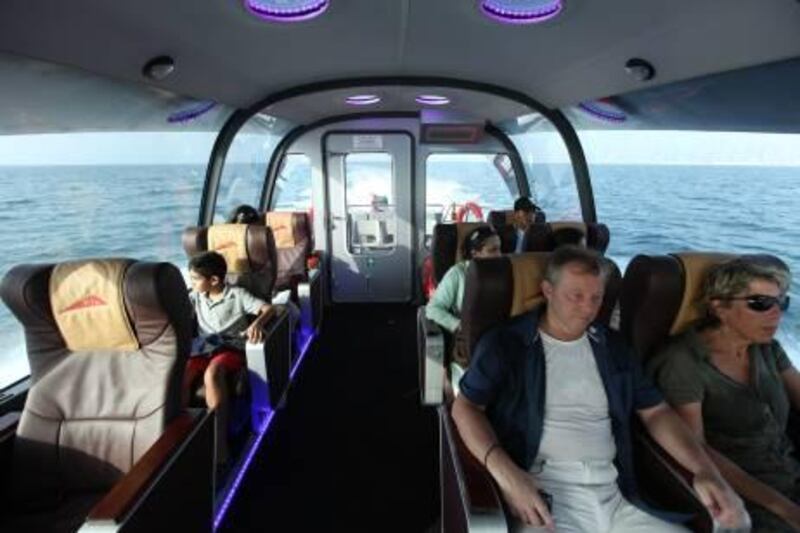DUBAI // The number of water taxis cleaving the waves along Dubai's coast is set to double before the year ends, buoyed by strong tourist demand.
The five gold-topped crafts with large tinted windows are particularly popular among tourists who check into hotels by the sea, according to Roads and Transport Authority (RTA) officials. The sleek 11-metre vessels, which cost Dh6 million each and reach speeds of up to 35 knots (65kph), began operation in July this year.
"Though it is early days of operation we have some encouraging ridership figures," said Essa Abdul al Dosari, the RTA public transport agency chief executive. "We have an average of five trips made per day in different locations. There will be at least five more water taxis added to the existing fleet within coming months."
Seating in the catamarans resembles that in an aeroplane's business-class section, including video screens for each passenger. The 20 stations along the water route link Dubai's high-end hotels along the coast to tourist spots in downtown areas and provide a different perspective on the emirate, making them ideal for sight-seeing.
"It's a completely different view of Dubai, more relaxed, without the hustle on the roads," said Ferdinando Alvarez, a tourist from Portugal who booked a vessel for his family from the Atlantis Hotel to Jumeirah Beach.
While Dubai residents tend to book over the weekend, most reservations for the air-conditioned service, which runs from 10am to 10pm, come from visitors to Dubai.
"Water taxis are more popular among tourists," Mr al Dosari said. "We get more service calls from Dubai Marina, the Atlantis and other coastal hotels. We have domestic customers especially on weekends and holidays, such as Eid."
Unlike the water bus and the traditional wooden abras, the water taxi is the sole public transport vessel that can leave the Dubai Creek and zip across the waters of the Arabian Gulf.
Mr Alvarez said the Dh250 he spent was well worth the cost, adding better advertising would help to further popularise the service.
"So many more tourists would use these taxis if they knew," he said. "It's fun to travel together with family and friends instead of separate cabs."
Mr al Dosari acknowledged that targeted advertising was needed.
"Specially with the small numbers of vessels available it is unlikely that people would see them in the water frequently," he said.
Water taxis can be booked much like a regular cab by using the RTA's toll-free number. An hour's ride of the commuter's choice along the Creek, Marina, downtown Dubai or Festival City can be had for Dh400. The minimum fare for a water taxi is Dh50 and can touch Dh570 for journeys from Dubai Festival City to the Jebel Ali Hotel and Spa. The vessels seat 11 people and the pilot, who points out local landmarks.
"Passengers enjoy the views and children shout out when it bounces on the waves," said a water taxi pilot who asked not to be named. "We have people who book for one hour and then extend for one more because they are excited to go see more places."
To see a video of Dubai's water taxis, see the latest entry in our Istabsir series here.







